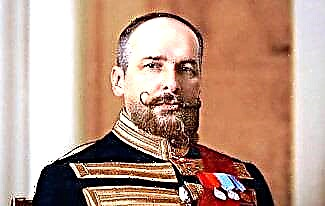Seren Obu Kierkegaard (1813-1855) - Danish religious philosopher, psychologist and writer. The founder of existentialism.
There are many interesting facts in the biography of Seren Kierkegaard, which we will talk about in this article.
So, here is a short biography of Kierkegaard.

Biography of Serena Kierkegaard
Seren Kierkegaard was born on May 5, 1813 in Copenhagen. He grew up and was brought up in the family of a wealthy merchant Peter Kierkegaard. The philosopher was the youngest child of his parents.
After the death of the head of the family, his children got a decent fortune. Thanks to this, Seren was able to get a good education. At the age of 27, he successfully graduated from the theological faculty of the University of Copenhagen.
A year later, Kierkegaard was awarded a master's degree, having defended his thesis "On the concept of irony, with a constant appeal to Socrates." It is important to note that parents from childhood instilled in their children the love of God.
However, after entering university and becoming familiar with Greek philosophy, Serenus revised his religious views. He began to analyze what was written in the Bible from a different angle.
Philosophy
In 1841, Kierkegaard settled in Berlin, where he devoted much time to thinking about human life and nature. At the same time, he revised the religious teachings that he adhered to in childhood and adolescence.
It was during this period of his biography that Seren began to form his philosophical ideas. In 1843 he published his famous work Ili-Ili, but not under his own name, but under the pseudonym Victor Eremit.
In this book, Seren Kierkegaard described 3 stages of human existence: aesthetic, ethical and religious. According to the author, the highest stage of human development is religious.
A couple of years later, another fundamental treatise by Kierkegaard, The Stages of the Life Path, was published. Then the focus was on another work of the philosopher "Fear and Awe", which dealt with faith in God.

The book "Illness to Death" aroused no less interest among the readers. It was a religious work devoted to the dialectic of despair, about the varieties of sin. In his understanding, sin was meant in the form of despair, and sin was to be viewed as opposed not to righteous behavior, but to faith.
During his lifetime, Soren Kierkegaard became the ancestor of existentialism - a trend in philosophy of the 20th century, focusing on the uniqueness of human existence. He spoke extremely negatively about rationalism, and also criticized the supporters of a subjective approach to philosophy.
Kierkegaard calls existing only those things that do not give reason to think about themselves, because thinking about something, a person interferes with the natural process of the course of things. Consequently, the object has already been changed by observation and therefore ceases to exist.
In existential philosophy, it is through the experience of events, and not thinking, that it is considered possible to know the world around. Objective truth is cognized, and existential truth should only be experienced.
In the last years of his biography, Soren Kierkegaard especially criticized the emasculation of the Christian life, namely, the desire to live happily and comfortably and at the same time call himself a Christian. Of all forms of power, he singled out monarchy, while he considered democracy the worst.
Personal life
When Kierkegaard was about 24 years old, he met Regina Olsen, who was 9 years older. The girl was also interested in philosophy, in connection with which the young people had many common topics for communication.
In 1840, Serain and Regina announced their engagement. However, almost immediately the guy began to doubt that he could be an exemplary family man. In this regard, after the conclusion of the engagement, he devoted all his free time to writing.
About a year later, Kierkegaard wrote a letter to the girl in which he announced the breakup. He explained his decision by the fact that he would not be able to combine work with married life. As a result, the thinker remained single until the end of his life and did not acquire offspring.
Death
Seren Kierkegaard died on November 11, 1855 at the age of 42. At the height of the flu epidemic, he contracted tuberculosis, which caused his death.
Kierkegaard Photos














